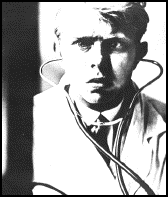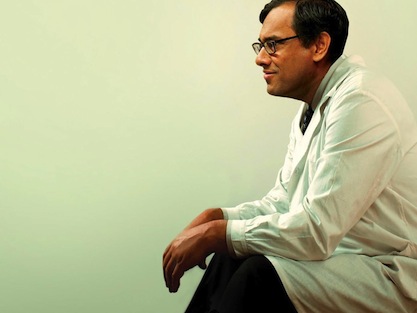
Doctored
The Disillusionment of
An American Physician
Sandeep Jauhar
(Farrar, Straus and Giroux)

There is a simple, one word diagnosis for American medicine: a mess. There might be another as well: a disgrace. It is a sad and dispiriting fact of modern life that we live in the richest country in the world, surrounded by astounding medical marvels at every turn only to be confronted with the disturbing reminder by the World Health Organization that we have some of the worst health outcomes on the globe. One out of every six dollars in this country is spent on healthcare. It amounts to trillions of dollars every year. And what do we get for that extraordinary expenditure? We rank 45th in life expectancy, behind Bosnia and Jordan, and we are near last in infant mortality.For those who are not ready to move to Bosnia, what are the prospects that things might actually improve in the future? Unfortunately, not good as our health care system is a direct expression of our culture, our values and our politics. Once we figure out how to change those, fixing health care will be simple.
The history of the Affordable Care Act illustrates the truth of this dilemma. The ACA was enacted into law in March, 2010 with the help of a Democratic president and Congress. It was the most ambitious effort to address problems with the American healthcare system since the enactment of Medicare and Medicaid in 1965. While the intentions of the new law might have been admirable, its implementation has been seriously hobbled by inherent flaws in the legislation itself and unremitting attacks by special interest groups and Republican lawmakers.
This might be the facile understanding of the current state of affairs by the average lay person. The problems, unfortunately, are much more complex and run far deeper. Trying to make sense of these problems and the efforts to solve them are the subject of Doctored: The Disillusionment of an American Physician by Sandeep Jauhar. Dr. Jauhar is the son of Indian immigrants and a practicing cardiologist on Long Island whose previous book, Intern, described the long and arduous road to becoming a specialist. The goal of this present volume is to strip away the façade and any lingering romantic illusions about modern American medicine and describe in graphic detail what it's like in the health care trenches.
The premise of this book is that much can be learned about how to heal American medicine, 40 years old in its modern incarnation, in a midlife portrait of one of its practitioners.
This is a decidedly positive spin on Dr. Jauhar's road to disillusionment. To be sure, he does mention several remedies to "heal" American medicine such as bundled payments, putting doctors on a salary, and creating accountable care organizations. But that is not the heart of this lucid and well-researched account. Rather what we have in excruciating detail, is a description of Dr. Jauhar's personal journey as he struggles to resolve the conflict between his youthful idealism and the bleak reality of modern specialty medicine.
In many ways I have become the kind of doctor I never thought I'd be: impatient, occasionally indifferent, at times dismissive or paternalistic.
Although he quotes abundant statistics to support his thesis that his experiences in a crowded urban setting are typical of what's occurring nationally, it's difficult to know how truly representative his portrait is of the nation as a whole, especially in smaller cities and rural towns.
And yet the points he makes are important to consider.
>Conflict of interest. As a young physician, Dr. Jauhar became a salaried employee of a prominent teaching hospital where he was a member of the Division of Cardiology.
As a member of the Division, I was trying to generate more revenue for my particular section (by doing ever more tests, more consults and seeing more outpatients). As a hospital employee, I was trying to keep down overall hospital costs. Nowhere was this conflict more evident than in my charge to reduce the length of stay of patients hospitalized with heart failure.
>Overutilization. Here is a summary of the problem.
Overutilization in health care is driven by many forces: "defensive" medicine by doctors trying to avoid lawsuits; reluctance on the part of doctors and patients to accept diagnostic uncertainty (leading to more tests); lack of consensus about which treatments are effective; and the pervading belief that newer, more expensive drugs and technology are better.
Dr. Jauhar then describes a disturbing --- although, by no means typical --- example of overutilization reflected in the experience of a 51-year-old patient admitted to his hospital with shortness of breath. During a month-long stay, this patient was seen by no fewer than 18 specialists and underwent 12 procedures. He was discharged with only minimal improvement in his initial complaint.
This case, in which expert consultations sprouted with little rhyme, reason, or coordination, reinforced the lesson I learned many times in my first year as an attending: In our healthcare system, if you have a slew of physicians and a willing patient, almost any sort of terrible excess can occur.
>Overregulation and gaming the system. In an effort to improve quality of care, employers and insurers, including Medicare, instituted what is known as pay for performance (P4P). This refers to a number of core measures that physicians are graded on. Better scores result in better reimbursement and, sometimes, even cash bonuses.
Whenever you try to dictate professional behavior, there are bound to be unintended consequences. With surgical report cards (a form of P4P), surgeons' numbers improve not only because of better performance but also because dying patients were not getting the operations they needed ... (And) what to do about complex patients with multiple medical problems? Half of Medicare beneficiaries over 65 have at least three chronic conditions ... P4P quality measures are focused on acute illness. It isn't at all clear they should be applied to elderly patients with multiple disorders who may have trouble keeping track of their medications. With P4P doling out bonuses, many doctors worry that they will feel pressured to prescribe "mandated" drugs, even to elderly patients who may not benefit, and to cherry-pick patients who can comply with the measures.
>The high cost of death and dying. This is the bleak challenge that awaits many of us: how to end our days not with pain and expensive procedures but with peace and dignity.
In the United States, patients with terminal illnesses often spend a large part of the end of their lives in the hospital ... Eighty-five percent of Americans die in the hospital or a nursing facility, and a third of all health care dollars is spent on patients in their last year of life. Every doctor I've talked to recognizes that this wastes precious resources and prolongs suffering.
After citing these depressing facts, Dr. Jauhar ends his analysis with this cheery conclusion:
But they --- I --- have not been taught a different way.
§ § § In summary, this is a useful if somewhat flawed book. Because it is an insider's account, it lacks the objectivity and broader perspective one might get from a more dispassionate observer. Further, the endless details of Dr. Jauhar's day to day struggles, while informative and mildly interesting, overwhelm the more important narrative of how to fix American medicine. Finally, there is Dr. Jauhar's obsession with money. It is true that our healthcare system is increasingly driven by financial considerations but that shouldn't mean we have to suffer through repeated handwringing about how he will pay his bills.
The glum reality was that we were cash poor. After we paid rent and student loans, there was very little left over. We had enough money to entertain desires ... but not nearly enough to realize them.
And so begins the slow crawl not to Nirvana but to disillusionment. But take heart: Dr. Jauhar is a respected and accomplished physician and there will always be patients, however they can pay, who will need his services.
 --- Lauro Halstead
--- Lauro Halstead